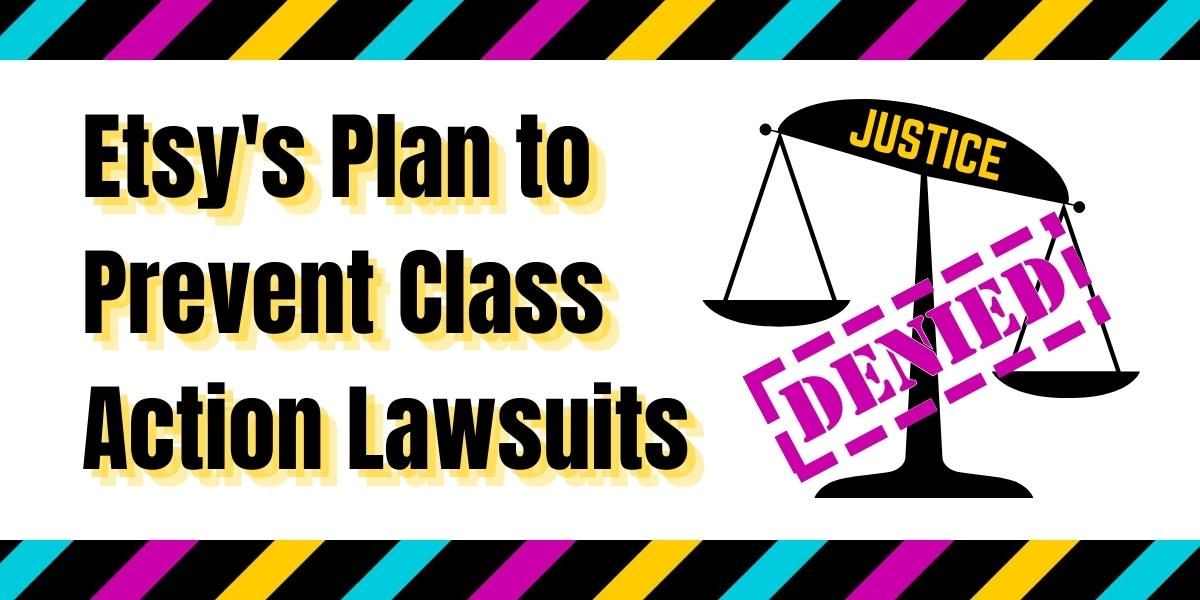Did you know that when you agree to Etsy’s Terms of Use, you agree never to join in a class action lawsuit against them, no matter what they do?
At least, that’s how it used to be. Until very recently, Etsy had a mandatory arbitration clause. It stated that by using their service (or continuing to use their service) we automatically agree that any disputes we have with them will be handled individually by the private arbitration company that they have chosen.
They’re making a change to their arbitration clause – as outlined in their recent email, “A quick update on our terms of use & policies”:
We’ve made some changes to our arbitration clause (section 11) for users in North and South America, to clarify which disputes must be arbitrated, explain how you can opt out of the arbitration process or reject the changes, and set rules and procedures for arbitration (including coordinated arbitrations), among other things. As before, the arbitration agreement includes a class action and jury waiver, which means we’ll be resolving most disputes in private, individual arbitration, and not in court. Please read this section carefully.
In 2015, the Consumer Financial Protection Bureau released a study showing that arbitration almost always benefits the corporation at the expense of the consumer. In 2017, they almost succeeded in passing a law to prevent class-action waivers in arbitration agreements for financial service corporations. Most mandatory arbitration agreements have held up in court, but there are also cases where courts have found these agreements “unconscionable”.
Today, corporations are trying to further shield themselves from accountability by quietly burying opt-out clauses into their lengthy arbitration agreements. So far, it’s working pretty well for them. When an opt-out clause was provided, and a corporation is sued by people who failed to opt out, the corporation has a better case to argue that the lawsuit is moot, and must be handled via individual arbitration.
Arbitration is a closed-door process, with decisions kept private, and a limited appeals process, if any. And it can only be done as an individual, which robs people of their ability to band together to fight back.
There is a serious situation brewing with Etsy’s Purchase Protection Program. In an attempt to sweep customer service issues under the rug, Etsy has been offering disgruntled buyers no-questions-asked, no-return-required refunds, with funds automatically taken from sellers’ payment accounts. In order to prevent sellers from bypassing this issue, Etsy has been imposing “Payment reserves” en masse. This means Etsy outright refuses to pay sellers the money they’ve earned from sales until after the order ships. For many made-to-order sellers, this creates a catch-22: sellers can’t get paid until they make and ship their orders, but often they can’t even make and ship their orders without getting paid!
Things aren’t looking good.
How to Opt out of Forced Arbitration
You can opt out of Etsy’s forced arbitration by following the exact instructions under “11.G” on this page. You have until Wednesday, August 23, 2023 to opt out, if you’re a current Etsy seller or buyer. To do so, you’ll need your username. It is not visible from your Etsy profile. Here is a link with instructions on how to find it.
Is it safe to opt out?
Opt out procedures exist so that corporations can argue to courts that we had a choice and we chose arbitration. Corporations don’t penalize people who opt out, since doing so would defy the whole purpose. While we can’t know exactly what Etsy is planning, we believe it is completely safe to opt out – and many of our members have already completed the opt out process.
What happens next?
There are 5.9 million active Etsy sellers, and 89.9 million active Etsy buyers. How many of them will take the time to actually read “A quick update” from Etsy? How many of them will understand the importance of the issue? How many will complete the steps to opt out?
Class action lawsuits don’t work if they’re limited to a tiny fraction of the people harmed by a corporation’s misdeeds. This will make the path towards holding Etsy accountable for their actions more difficult.
We’re keeping an eye on the situation, and we will keep you informed. In doing research for this blog post, we found a bill currently in the US Senate that – at first glance – seems designed to protect our rights to a class action lawsuit, and prevent corporations from forcing us into individual arbitration. It’s called the FAIR act, and we plan to research it in-depth for a future blog post.
If you wish to join the discussion on forced arbitration, you’ll find it in the #shop-chat channel of our Discord server. The link to our Discord server (along with a tutorial for those unfamiliar with the online chat app) is in the members only area of our site.
Please share this post with any Etsy sellers or buyers you know! We must protect our rights.



Comments are closed, but trackbacks and pingbacks are open.